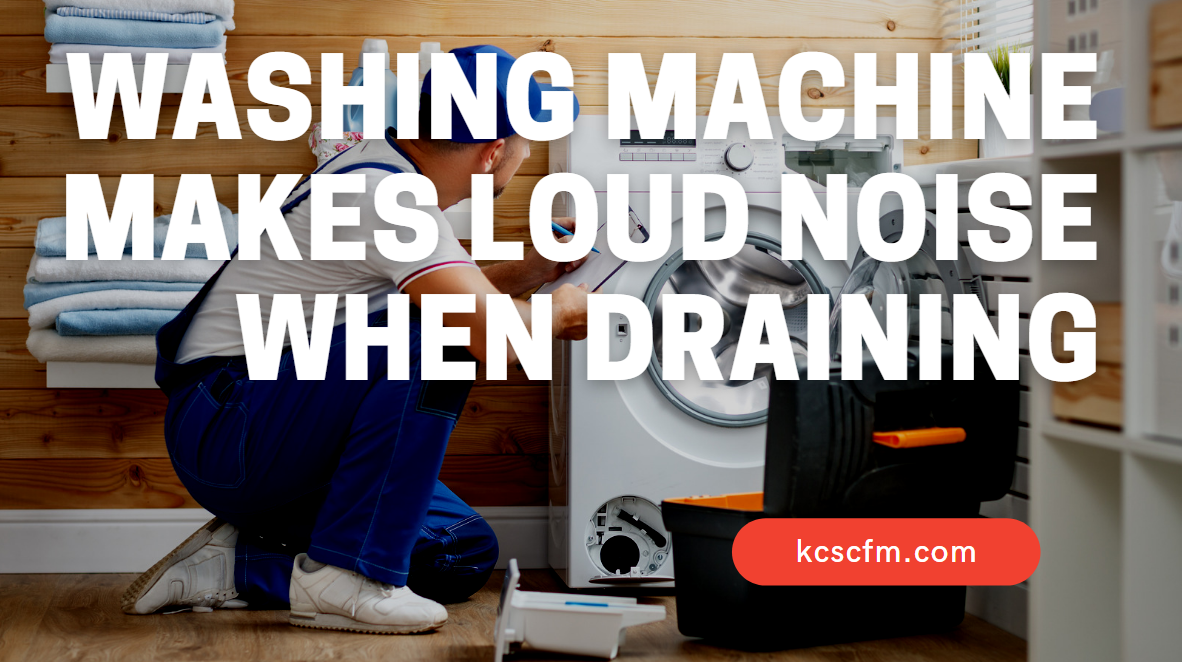A washing machine that makes a loud noise when draining after the spin cycle may indicate that there is an issue with the pump or drain hose. These issues can be prevented by using the machine’s diagnostic cycle to check for problems before beginning a wash cycle, and keeping the drain hose and pump clear of debris.
Normal sounds are rumbling, humming, and whirring noises that usually indicate normal operation. Lifting or thumping noises are also common — this is the washer moving water through the machine. Any loud and unusual noises that happen when the washer is draining suggest a problem.
A loud noise coming from your washing machine may be a sign that something is stuck in the pump or the filter. It’s possible that the impeller has been damaged by a foreign object, which can impede the movement of the water. If this happens, the pump shouldn’t be running for long periods of time and could lead to problems in other, more delicate parts of the machine.
When your washing machine suddenly becomes loud, it’s a sign that there could be something wrong. The noise could come from the pump or its impeller, or any number of different sources. Depending on the reason behind the sound, you might want to repair or replace the parts in your washing machine if they break. Otherwise, you can simply wait for the sound to go away.
If your washing machine is prone to making loud noises, you’re not alone. Many washers make at least some degree of noise, which proper maintenance can help prevent. Read on to learn more about the potential causes of this problem and what you can do to fix it and prevent it from happening in the future.
Washing Machine Makes Loud Noise When Draining – Troubleshoot And Diagnosis

Washing machines may start making strange noises when they’re draining, and it can be a nightmare to figure out what the problem is.
It can mean that the pump is damaged or a foreign object such as a sock or sock-bone has gotten stuck in it. It could also mean that there’s a clog or damage to the impeller. You could check all of these, but let’s focus on what you can do about each of them.
1. Clogged Drain Pump
The first thing you should check when your machine is acting up is its drain pump. If it’s been cleared, the next step is to ensure there’s nothing left in the washer that can create a blockage.
Remember to always empty your pockets before throwing them in the washing machine! Pens and other hard objects are the most common things found inside drain pumps and can easily lead to a malfunction. Frequently, these metal pieces will fall out of clothing during a wash cycle. If you’re washing your clothes with an old pair of jeans, for example, then you may experience more loose metal particles than usual.
If the impeller does not turn when clothes are in the washer, that means that something is stuck in there, like a sock or a pair of underwear. That can cause the loud noises that you hear and make your washer not spin and drain properly.
A hard object like a coffee spoon is accidentally thrown into the washing machine and gets caught in between the drain pump and the impeller. The pump will keep on trying to turn the impeller, and that causes the loud noises.
Loud noises coming from the washer are a common problem, and they’re usually caused by something getting caught in the drain pump — this debris can be anything from clothing to a dog toy.
To fix the problem, Cleaning out the pump will solve the problem quickly, but if you don’t have a lot of time to spare, try pouring down a large quantity of liquid detergent — this will help to move the object through the pump and into the waste basket.
For example, if you recently removed your machine from an area with visible dust like a garage or shed, remove the pump to check for debris. You can pry out any loose objects by hand. If there is still a problem, then consider having a professional look at the pump to make sure there are no remaining blockages.
If a washing machine pump breaks down, it might be impractical to try getting all of the broken parts out of it. A simpler solution is to replace the pump with a new one —especially when replacement pumps aren’t very expensive.
2. Damaged Impeller
Loud noises while draining your washing machine can happen when the drain pump impeller is broken.
The impeller turns to drive water in one direction through the pump. This forces dirty water out of the washing machine and up to and out of your sink through a hose at the rear of the machine.
The washer pump is the lifeblood of your washer, and any foreign objects that pass through can cause damage to vital parts inside. When this happens, your pump impeller may become loose or misaligned, or its vanes can become deformed.
The problem is that your washer’s drain pump is hitting against the drain pump housing, causing the pump to grind against its machinery and ultimately break down.
When washers or dryers start to make a lot of loud noises, the cause is usually a bad pump. The noise might sound like grinding, rattling, squeaking or clunking. A bad pump can also cause your washer or dryer to leak water from the bottom of the machine.
Your washing machine has an impeller and drain pump that can stop turning or fail completely. Luckily, most brands allow you to remove and replace the impeller separately. Unfortunately, if your brand doesn’t allow you to do that, you’ll have to replace the entire pump.
3. Drain Pump Filter Is Clogged
After you’ve ruled out the drain pump, the next thing to check is the drain pump filter. It is located near the drain pump and can be easily changed if it is clogged or damaged. This part prevents small objects from getting pumped up into your washing machine.
Washing machines are full of all sorts of foreign objects, from coins and paper clips to clothing labels and other bits of lint or dirt. A filter in your washing machine catches these objects before they can damage the rest of your washer.
Washing machine drain filter clogs often go unnoticed because they’re hidden away. When you do notice them, the results are frustrating and costly. Cleaning the washer drain filter is critical for maintaining your washing machine and prolonging its lifespan.
The filters for washing machines are usually at the bottom of the device, and they act as a barrier that stops large items from going down the drain. These things can include chunks of detergent, food particles, dust, and hair.
Because a washer pump must push water through the filter to get to the drain, any buildup inside can slow down the process and cause loud noises. If your washer is laboring to push water through the filter, there’s a chance that it could break.
Whenever the washer fills up with water, the drain filter will get clogged up with dirt and debris. You can resolve this issue by resetting the filter. Here’s how:
- Unscrew the cap on the filter housing to reveal the drain filter.
- Twist open the drain filter to remove all of the debris inside.
- Screw the cap back on, and you’re done!
4. Defective Pulley
If you use your washer, you’ll probably hear it squeal or thump at some point, particularly when draining. This is a sign that something is wrong, but there are a few things to keep in mind before you panic. For starters, if your washer makes the noise when you try to spin out excess water from the machine, the pulley might be the culprit — not the washer itself.
The three pulleys – drive motor pulley, transmission pulley, and pump pulley – are important for a washer’s functionality. The drive motor pulley helps the motor turn the drum. The transmission pulley helps move the transmission, which in turn turns the drum. The pump pulley moves water out of the machine.
Inspect all the washer’s pulleys and belts (if installed) for any visible signs of damage. Sagging or visible fraying can be an indicator that a replacement is needed.
If you find any, a replacement may be necessary for the affected pulley and belt.
5. Faulty Transmission
Like any other household appliance, a washing machine is capable of making strange sounds. But your washing machine may not be out to get you with its noises — in fact, it’s more likely that these sounds come from the transmission as opposed to the motor or drums. Washing machines are designed to operate in a specific manner, and they often make noises during each phase of their cycle.
you should also take a good look at the sounds your washing machine is making. They may not necessarily be coming from the drum or the motor, but rather from another crucial mechanical part: the transmission. The reason you hear these sounds only when the machine drains (which happens often during spin) is because it’s coming from the spin gear in the transmission.
When washers don’t spin or drain, it’s often because of a bad gearcase. Gearcases are metal containers that hold the gears that drive your washer’s transmission system and supply power to the other electrical components, such as the timer and water valve.
Washing machines that have faulty gearcases can be costly to repair, usually requiring that they be taken apart and the gear inside replaced. If you suspect that your washing machine has a faulty gearcase, contact the washing machine helpline number.
If you’re on the hunt for a new washer, there’s a crucial decision you’ll have to make: is it better to buy a used washer or to replace your old one with a new model? If your machine is already pretty old and worn out, it might be better to shop for something newer.
Many washing machines last at least ten years, so it’s often a good idea to get yours repaired rather than buy a new one. However, if your washing machine is very old and your repair costs are too high, you may want to consider replacing your washer instead. That will save you money in the long run.

Hi there! I’m Sam Hendricks, and I’m a repair technician and expert. I created this website to help people like you save money and time by fixing your own appliances.
Over the years, I’ve seen people spend a lot of money on unnecessary repairs or replacements. That’s why I decided to share my expertise and create easy-to-follow guides for fixing appliances on your own.
